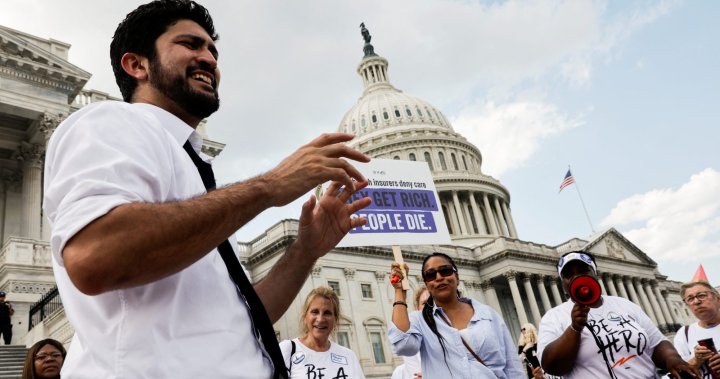A U.S. congressman from Texas orchestrated a unique protest on Tuesday, staging a day-long “thirst strike” to advocate for federal safety standards for workers in extreme heat conditions. With the backdrop of soaring temperatures, Representative Greg Casar, a Democrat, took a stand on the steps of the U.S. Capitol. Refusing to eat, drink water, or take breaks from the scorching 30 degrees Celsius (86 degrees Fahrenheit) heat in Washington, D.C., Casar aimed to draw attention to the urgent need for worker protections.
During his strike, Casar also held a vigil to honor workers who have tragically lost their lives due to heat-related illnesses while on the job. Throughout the day, several other Democrats joined him to show their support for his cause. Casar declared that he would end his strike only when nurses advised him to stop.
Despite the challenging and sweaty conditions, Casar remained determined. He noted that the Washington heat was nothing compared to the searing temperatures in Texas, where his district includes parts of Austin and San Antonio. On that particular day, temperatures in his district were expected to reach a scalding 38 degrees Celsius (100 degrees Fahrenheit).
The urgency for federal safety standards for working in extreme heat is amplified by the continuous shattering of heat records worldwide, including in the U.S. and Canada. In recent months, numerous heat and rainfall records have been broken, with Texas alone setting 369 daily high-temperature records since June 1. The nonprofit advocacy group Public Citizen estimates that heat exposure is responsible for at least 600 worker fatalities and 170,000 workplace injuries per year on average in the U.S.
Casar’s thirst strike was spurred by the passing of a Texas law that prevents cities from implementing local regulations that offer more protections than state laws. The law, signed by Texas Governor Greg Abbott, erases local ordinances in cities like Austin, Dallas, and Houston, which previously mandated water and rest breaks for workers during extreme heat events. Casar had previously championed similar local protections in Austin and Dallas in 2010 and 2015, respectively.
Critics and workplace safety advocates express concern that the absence of state regulations to replace the local laws will result in insufficient protections for workers against heat exposure and dehydration. While a spokesperson for Abbott’s office assures that the new legislation aligns with federal standards set by the U.S. Occupational Safety and Health Administration (OSHA), OSHA currently only has a general duty clause that requires employers to maintain a workplace free from hazards that threaten employees’ health or lives. However, OSHA is actively working on creating specific federal standards for workplace heat safety rules, though it is not expected to be introduced or enforced this year.
In the absence of federal standards in the U.S., only three states – California, Washington, and Minnesota – have statewide laws in place that specifically address worker protections related to heat. Meanwhile, in Canada, although there is no federal standard, each province and territory has its own rules to ensure employers provide protections for workers during extreme heat. WorkSafeBC, which operates in British Columbia, emphasizes the importance of heat protections for workers, highlighting the vulnerabilities of not acclimatizing to a new working environment. Provincial and territorial regulations in Canada typically reference guidelines from the American Conference of Governmental Industrial Hygienists to determine when safety measures should be implemented.
Casar and more than 100 other members of Congress are calling for swift action by the U.S. Department of Labor and OSHA to implement federal workplace heat standards. While challenges persist due to the acting status of Labor Secretary Julie Su, who was nominated by President Joe Biden but withdrawn after lack of Senate support, Casar and his colleagues are pushing for worker protections that include hydration, rest breaks, on-site medical services, and more safety requirements.
In conclusion, Casar’s “thirst strike” sheds light on the urgent need for federal safety standards to protect workers in extreme heat conditions. As record-breaking temperatures persist, the plight for worker safety becomes increasingly critical, and advocates aim to secure adequate protections to prevent heat-related illnesses and fatalities.
Denial of responsibility! VigourTimes is an automatic aggregator of Global media. In each content, the hyperlink to the primary source is specified. All trademarks belong to their rightful owners, and all materials to their authors. For any complaint, please reach us at – [email protected]. We will take necessary action within 24 hours.


